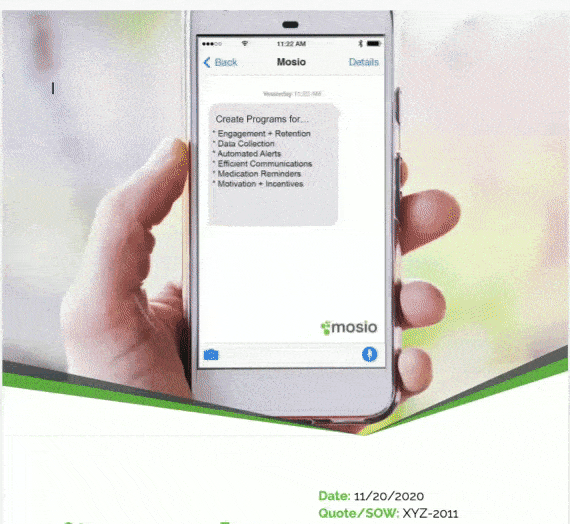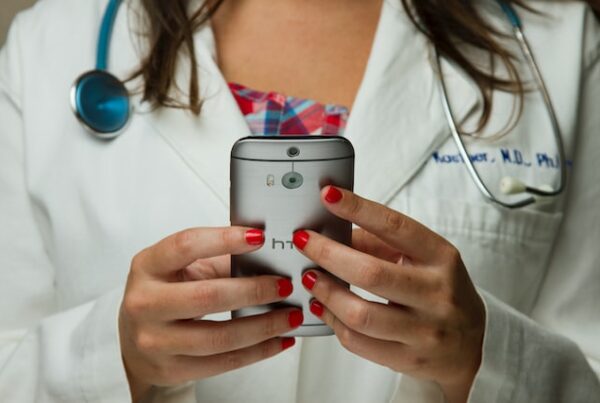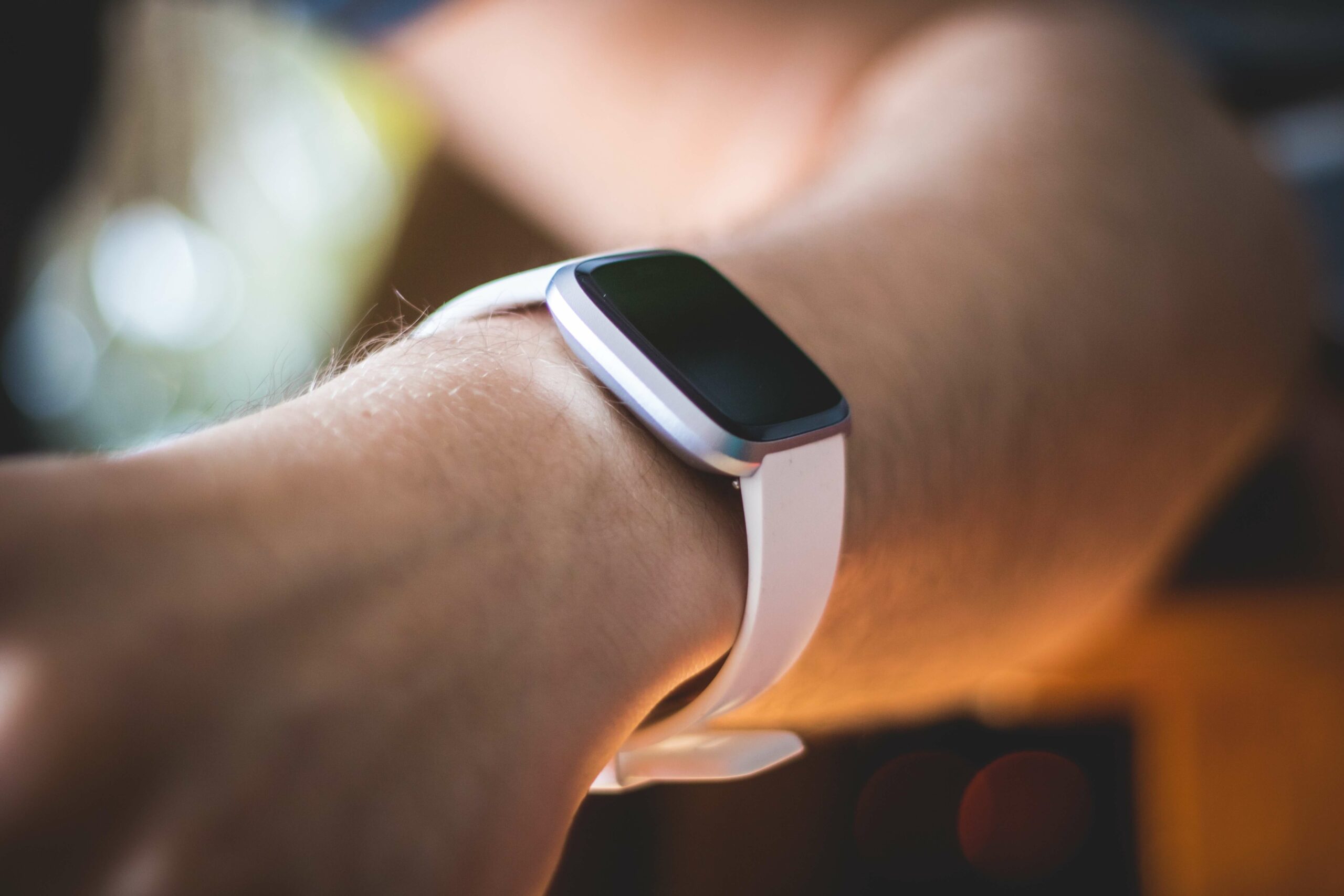10 Mobile Health Research Studies Using Text Messaging – Part 1
Text messaging is the most utilized and ubiquitous feature of a mobile phone, making it perfect for clinical trials and mobile health research. Text messaging is used more than phone calls, has over a 90% open rate and is functional on over 98% of all phones manufactured today. Everyone is texting. In research, it is not only being used as a recruiting tool, it is also used as a way of sending alerts, reminders and as a data gathering (ePRO) tool.
We’ve compiled a list of 10 mobile health studies below, including obesity treatment for adolescents, emergency admissions at a hospital, in mental health, treatment for bulimia and post-op vasectomy outcomes to name a few. All studies listed below have links to their respective findings and papers.
If you are conducting a research study and have any questions about how text messaging can help you improve in-patient recruiting, program reminders and data collection, please visit our text messaging for research services page or call Gabriel Macias: 877.677.4699 Ext. 703.
LIST OF STUDIES, PUBLICATIONS AND PAPERS:
Abstract:
Critical laboratory results require timely and accurate transmission to the appropriate caregiver to provide intervention to prevent an adverse outcome. We report the use of text messages to notify critical laboratory results in a large teaching hospital to manage the documentation and audit requirements of critical result reporting by regulatory agencies.
Sharon Saw, PhD1,
Tze Ping Loh, MBBChBAO1,
Sophia Bee Leng Ang, MBBS, MMED2,
James W. L. Yip, MBBS, MRCP, FAMS3
Sunil Kumar Sethi, FRCPath, PhD1
1From the Departments of Laboratory Medicine, 2Anaesthesia, and 3Cardiology, National University Hospital, Singapore
Published on 2011
—————————————————————————————————————-
Objectives:
The objective of this study was to assess knowledge, attitudes, and behaviors surrounding healthcare-related mobile phone use and text messaging among persons at risk for or infected with tuberculosis (TB) or the human immunodeficiency virus (HIV).
Anna K. Person, M.D.,1 Michela L.M. Blain,2 Helen Jiang,2 Petra W. Rasmussen,2 and Jason E. Stout,M.D., M.H.S.1
1Division of Infectious Diseases and International Health, Duke University Medical Center, Durham, North Carolina.
2Duke University, Durham, North Carolina.
Division of Infectious Diseases and International Health
Duke University Medical Center
Published online: April 2, 2011
—————————————————————————————————————-
3) Use of text messaging to audit early clinical outcome following vasectomy in primary care
Abstract:
Fifty patients undergoing vasectomy at community-based day surgery clinics in Grampian were invited to participate in follow-up by text message. Forty-six (92%) of the patients responded, 14 reporting problems, generally of a minor nature, but severe enough to result in unscheduled time off work (n = 4) and oral antibiotic therapy (n = 5). Text messaging appears to be a useful form of communication for audit in this setting. The study findings have influenced the information provided by the authors at preoperative counseling.
Graham Cooper, MD, FRCS, consultant in community surgery
Grampian Community Surgery Programme, Minor Surgery Service, Aberdeen City CHP, Aberdeen
Jean Walker, BMedSci, BAO, DRCOG, MRCGP, DCHGP
Maryhill Practice, Elgin Health Centre, Maryhill, Elgin
Douglas Harris, FRCGP, GP
Peterculter Medical Practice, Peterculter, Aberdeen
Rorie Stewart, BMSc(Hons), MRCGP, GP
Oldmachar Medical Practice, Aberdeen
Douglas Nicol, BMedBiol, FRCGP, MFHom, DRCOG, DFFP, clinical lead for minor surgery in general practice
Mintlaw Group Practice, Mintlaw, Aberdeenshire
Mike Ogg, RMN, RGN, CPN, CMS, DMS, general manager
Inverurie Hospital, Inverurie, Aberdeenshire
Published: April 2011
—————————————————————————————————————-
Objective:
Given the lack of maintenance interventions for eating disorders, a mobile health program delivered via the short message service (SMS) and text messaging was developed to support patients after their discharge from inpatient treatment.
Bauer S, Okon E, Meermann R, Kordy H.
Center for Psychotherapy Research
Published: August 2012
—————————————————————————————————————-
5) Mobile therapy: Use of text-messaging in the treatment of bulimia nervosa
Objective:
To examine a text-messaging program for self-monitoring symptoms of bulimia nervosa (BN) within the context of cognitive-behavioral therapy (CBT).
Jennifer R Shapiro, Stephanie Bauer, Ellen Andrews, Emily Pisetsky, Brendan Bulik-Sullivan, Robert M Hamer, Cynthia M Bulik
Department of Psychiatry, University of North Carolina at Chapel Hill, North Carolina 27599, USA.
Published: September 2010
—————————————————————————————————————-
6) Text message communication in primary care research: a randomized controlled trial
Background:
Text message communication is increasingly used in mHealth clinical practice but rarely in research. Particularly in young people, this method of participation in primary care research appears both feasible and acceptable. However, previous experience shows that text messaging for research may lead to lower response rates.
Dagmar M Hallera,b, Lena A Sancib, George C Pattonc,d,e and Susan M Sawyerc,d,e
aDepartment of Community Medicine & Primary Care, Geneva University Hospitals & University of Geneva, 24 rue Micheli-du-Crest, 1211 Geneva, Switzerland
bDepartment of General Practice, The University of Melbourne, 200 Berkeley Street, Carlton 3053, Australia
cCentre for Adolescent Health, Royal Children’s Hospital
dDepartment of Paediatrics, The University of Melbourne
eMurdoch Children’s Research Institute at the Royal Children’s Hospital, Melbourne, Australia
Published: June 19, 2009
—————————————————————————————————————-
7) Mobile phone text messaging for pharmaceutical care in a hospital in China
Abstract:
We have developed a mobile pharmacy service system (MPSS) to deliver individualized pharmaceutical care via mobile health text messages sent to the mobile phones of patients.
Yudan Mao*, Yantao Zhang† and Suodi Zhai*⇓
*Department of Pharmacy, Peking University Third Hospital, Beijing
†Power System Department, China Electrical Power Research Institute,Beijing, China
Published: December 2008
—————————————————————————————————————-
Objective:
Forgetting is commonly stated as a reason for missing mental health appointments. The authors examined the effect of short message service (SMS), or text message, reminders on the attendance of appointments at four community mental health clinics in London.
Hannah Sims, M.Sc.; Harpreet Sanghara, M.Sc., P.G.Cert.P.W.P.; Daniel Hayes, M.Sc.; Symon Wandiembe, M.Sc.; Matthew Finch; Hanne Jakobsen, D.Clin.Psy.; Elias Tsakanikos, M.Sc., Ph.D.; Chike Ify Okocha, Ph.D., F.R.C.Psych.; Eugenia Kravariti, M.Sc., Ph.D.
Ms. Sims, Mr. Hayes, and Dr. Kravariti are affiliated with the Department of Psychosis Studies, Mr. Wandiembe is with the Department of Biostatistics, and Dr. Tsakanikos is with ESTIA Centre, Department of Health Services Population Research, all at the Institute of Psychiatry, King’s College London.
The other authors are with Oxleas National Health Service Foundation Trust in London—Ms. Sanghara with the Service of Improving Access to Psychological Therapies (IAPT); Mr. Finch and Dr. Okocha with Pinewood House, Pinewood Place; and Dr. Jakobsen with Queen Elizabeth Hospital.
Published: February 01, 2012
—————————————————————————————————————-
9) Effects of a short text message reminder system on emergency department length of stay
Purpose:
Specialty consultations and waiting for admission to a hospital bed are major contributors to increased length of stay and overcrowding in the emergency department. We implemented a computerized mobile health short messaging service to inform care providers of patient delay in order to reduce the length of stay. The purpose of this study was to evaluate the effects of this strategy on the length of stay in the emergency department.
Min Joung Kim1,Joon Min Park2, Sang Mo Je1, Je Sung You1, Yoo Seok Park1, Hyun Soo Chung1, Sung Phil Chung1, Hahn Shick Lee1
1Yonsei University College of Medicine, Seoul, Republic of Korea
2Inje University Ilsan Paik Hospital, Goyang, Republic of Korea
Published Online: February 02, 2012
—————————————————————————————————————-
10) Tailored mobile phone text messages as an adjunct to obesity treatment for adolescents
Abstract:
We examined the use of mobile health tailored messages sent to the mobile phones of obese adolescents enrolled in a weight-management program, as a means of increasing adherence.
Woolford SJ, Clark SJ, Strecher VJ, Resnicow K.
Pediatric Comprehensive Weight Management Center, University of Michigan, Ann Arbor, Michigan 48109-5456, USA.
Date: 10/21/2010
—————————————————————————————————————-
Want to learn more? Join the Patient Recruitment and Retention (PR+R) Group on LinkedIn!
Get a quote for Mosio’s patient engagement solutions.









